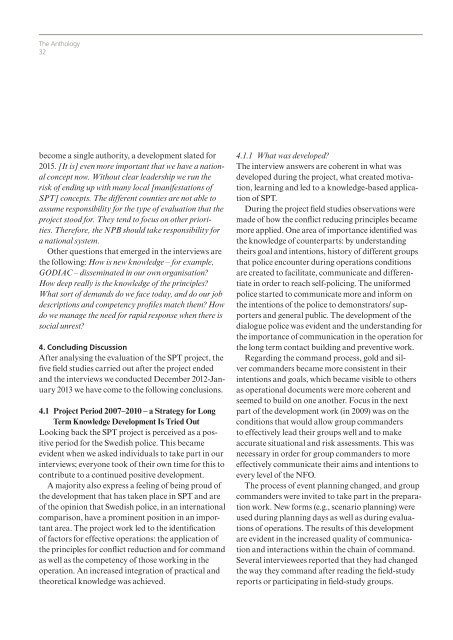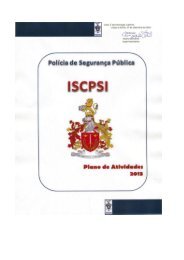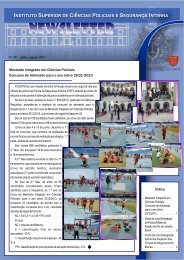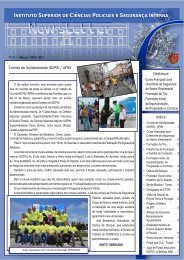The Anthology
The Anthology
The Anthology
Create successful ePaper yourself
Turn your PDF publications into a flip-book with our unique Google optimized e-Paper software.
<strong>The</strong> <strong>Anthology</strong><br />
32<br />
become a single authority, a development slated for<br />
2015. [It is] even more important that we have a national<br />
concept now. Without clear leadership we run the<br />
risk of ending up with many local [manifestations of<br />
SPT] concepts. <strong>The</strong> different counties are not able to<br />
assume responsibility for the type of evaluation that the<br />
project stood for. <strong>The</strong>y tend to focus on other priorities.<br />
<strong>The</strong>refore, the NPB should take responsibility for<br />
a national system.<br />
Other questions that emerged in the interviews are<br />
the following: How is new knowledge – for example,<br />
GODIAC – disseminated in our own organisation?<br />
How deep really is the knowledge of the principles?<br />
What sort of demands do we face today, and do our job<br />
descriptions and competency profiles match them? How<br />
do we manage the need for rapid response when there is<br />
social unrest?<br />
4. Concluding Discussion<br />
After analysing the evaluation of the SPT project, the<br />
five field studies carried out after the project ended<br />
and the interviews we conducted December 2012-January<br />
2013 we have come to the following conclusions.<br />
4.1 Project Period 2007–2010 – a Strategy for Long<br />
Term Knowledge Development Is Tried Out<br />
Looking back the SPT project is perceived as a positive<br />
period for the Swedish police. This became<br />
evident when we asked individuals to take part in our<br />
interviews; everyone took of their own time for this to<br />
contribute to a continued positive development.<br />
A majority also express a feeling of being proud of<br />
the development that has taken place in SPT and are<br />
of the opinion that Swedish police, in an international<br />
comparison, have a prominent position in an important<br />
area. <strong>The</strong> project work led to the identification<br />
of factors for effective operations: the application of<br />
the principles for conflict reduction and for command<br />
as well as the competency of those working in the<br />
operation. An increased integration of practical and<br />
theoretical knowledge was achieved.<br />
4.1.1 What was developed?<br />
<strong>The</strong> interview answers are coherent in what was<br />
developed during the project, what created motivation,<br />
learning and led to a knowledge-based application<br />
of SPT.<br />
During the project field studies observations were<br />
made of how the conflict reducing principles became<br />
more applied. One area of importance identified was<br />
the knowledge of counterparts: by understanding<br />
theirs goal and intentions, history of different groups<br />
that police encounter during operations conditions<br />
are created to facilitate, communicate and differentiate<br />
in order to reach self-policing. <strong>The</strong> uniformed<br />
police started to communicate more and inform on<br />
the intentions of the police to demonstrators/ supporters<br />
and general public. <strong>The</strong> development of the<br />
dialogue police was evident and the understanding for<br />
the importance of communication in the operation for<br />
the long term contact building and preventive work.<br />
Regarding the command process, gold and silver<br />
commanders became more consistent in their<br />
intentions and goals, which became visible to others<br />
as operational documents were more coherent and<br />
seemed to build on one another. Focus in the next<br />
part of the development work (in 2009) was on the<br />
conditions that would allow group commanders<br />
to effectively lead their groups well and to make<br />
accurate situational and risk assessments. This was<br />
necessary in order for group commanders to more<br />
effectively communicate their aims and intentions to<br />
every level of the NFO.<br />
<strong>The</strong> process of event planning changed, and group<br />
commanders were invited to take part in the preparation<br />
work. New forms (e.g., scenario planning) were<br />
used during planning days as well as during evaluations<br />
of operations. <strong>The</strong> results of this development<br />
are evident in the increased quality of communication<br />
and interactions within the chain of command.<br />
Several interviewees reported that they had changed<br />
the way they command after reading the field-study<br />
reports or participating in field-study groups.






